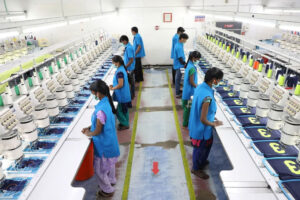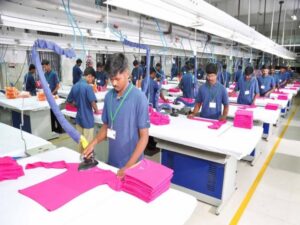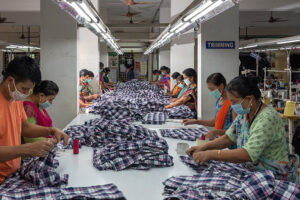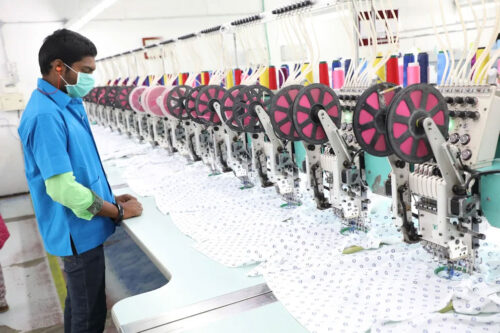Why Businesses Manufacture Clothing in Bangladesh?
If you’ve ever wondered why so many businesses choose to manufacture their clothing in Bangladesh, you’re not alone. With its growing reputation as a major hub for the global garment industry, Bangladesh has become a preferred destination for many companies. But what makes this country so attractive for clothing manufacturing? From low production costs and skilled labor to its strategic geographical location, there are several factors that contribute to this trend. In this article, we will explore why businesses choose Bangladesh as their manufacturing base and the benefits it offers to both companies and consumers alike.

Cost-effectiveness
Low labor costs
Bangladesh offers one of the lowest labor costs in the world, making it an attractive destination for clothing manufacturers. The average wage for garment workers in Bangladesh is significantly lower compared to other countries, allowing businesses to save on production expenses. This cost advantage enables companies to offer competitive prices to consumers without compromising on the quality of their products.
Affordable production expenses
In addition to low labor costs, Bangladesh also provides affordable production expenses. The cost of setting up a garment factory and acquiring machinery and equipment is relatively lower compared to other countries. The availability of affordable production facilities and utilities, such as electricity and water, further contributes to the cost-effectiveness of manufacturing clothing in Bangladesh.
Access to raw materials at lower prices
Another factor that enhances cost-effectiveness is the availability of raw materials at lower prices in Bangladesh. The country has ample access to cotton, the most widely used fabric in the garment industry. With a strong agricultural base and favorable climate conditions, Bangladesh can produce cotton domestically, reducing the reliance on expensive imported materials. This access to affordable raw materials helps manufacturers minimize production costs and maintain competitive pricing.
Skilled Workforce
Large pool of skilled and experienced workers
One of the key advantages of manufacturing clothing in Bangladesh is the abundance of skilled and experienced workers. The country has a large pool of individuals with expertise in various aspects of garment manufacturing, from pattern making and cutting to sewing and quality control. These skilled workers have acquired their knowledge and expertise through years of experience in the industry, making them highly valuable assets for clothing manufacturers.
Specialization in garment manufacturing
Bangladesh has developed a specialization in garment manufacturing, which further enhances the skill level of its workforce. The country’s focus on the garment industry has allowed it to refine and perfect its production processes, resulting in a highly skilled workforce. By having specialized knowledge and expertise specific to the garment industry, workers in Bangladesh can deliver high-quality products with efficiency and precision.
Technical proficiency in various production processes
When it comes to technical proficiency, the workforce in Bangladesh excels in various production processes. From basic sewing and stitching techniques to intricate embroidery and embellishments, the skilled workers in Bangladesh have mastered a wide range of skills. This technical proficiency allows businesses to undertake complex designs and meet the demands of diverse markets, ensuring the production of high-quality garments that meet international standards.
Infrastructure and Industry Support
Established industrial zones and factories
Bangladesh boasts a well-established system of industrial zones and factories dedicated to the garment industry. These designated areas provide a conducive environment for clothing manufacturers, allowing them to operate efficiently and effectively. The industrial zones are equipped with necessary infrastructure, including roads, electricity, and water supply, which helps streamline production processes and reduce operational costs. The presence of established factories also facilitates collaborations and networking opportunities within the industry.
Investments in infrastructure development
To support the growth of the garment manufacturing industry, Bangladesh has made significant investments in infrastructure development. This includes the construction and improvement of transportation networks, such as roads, highways, and ports, which facilitate the movement of goods and raw materials. The availability of efficient infrastructure enhances the overall efficiency and competitiveness of the industry, making Bangladesh an attractive manufacturing destination.
Supportive government policies and incentives
The government of Bangladesh recognizes the importance of the garment industry and has implemented supportive policies and incentives to attract and retain businesses in the sector. These policies provide various benefits, such as tax incentives, duty exemptions, and streamlined administrative procedures, which help reduce operating costs and facilitate business operations. The government’s commitment to industry growth and development strengthens the overall ecosystem for garment manufacturing in Bangladesh.
Presence of industry associations and networks
Bangladesh’s garment manufacturing industry benefits from the presence of industry associations and networks. These associations act as a collective voice for manufacturers, advocating for their interests and providing support and guidance. They also facilitate knowledge sharing, collaboration, and networking opportunities among industry players. The presence of such associations and networks reinforces the sense of community and cooperation within the garment manufacturing sector in Bangladesh.
Efficient Supply Chain
Proximity to major textile and garment markets
Bangladesh’s strategic location provides a significant advantage in terms of its proximity to major textile and garment markets. The country is located in South Asia, adjacent to India and in close proximity to Southeast Asian countries. This geographical advantage reduces transportation costs and lead times, allowing manufacturers to respond quickly to market demands and trends. Being close to major markets also facilitates efficient communication and coordination with buyers, further enhancing the supply chain efficiency.
Well-developed logistics and transportation networks
Bangladesh has invested in the development of well-organized logistics and transportation networks. It has established efficient road and rail systems, as well as modern seaports and airports, to facilitate the movement of goods both domestically and internationally. These well-developed networks enable manufacturers to transport raw materials and finished products swiftly and cost-effectively. The seamless and reliable logistics infrastructure contributes to the overall efficiency of the supply chain, ensuring timely deliveries and customer satisfaction.
Streamlined production and delivery processes
Efficiency is a top priority for garment manufacturers in Bangladesh, and streamlined production and delivery processes play a crucial role in achieving this. Manufacturers in the country have optimized their production flows and implemented advanced manufacturing techniques to minimize lead times and maximize output. The focus on lean manufacturing allows for the efficient utilization of resources, reduction of waste, and continuous improvement in productivity. These streamlined processes contribute to the overall competitiveness of the industry and enable businesses to meet tight production deadlines.

Compliance with International Standards
Improvements in workplace safety and labor conditions
Over the years, Bangladesh has made significant progress in improving workplace safety and labor conditions. The tragic Rana Plaza building collapse in 2013 served as a wake-up call for the country, leading to important reforms and initiatives to enhance worker safety. The government, along with international organizations and industry stakeholders, implemented measures to enforce building safety codes, enhance fire safety measures, and ensure proper working conditions. This commitment to improving worker safety and labor conditions has made Bangladesh a more responsible and reliable manufacturing destination.
Adherence to labor and environmental regulations
To ensure compliance with international standards, Bangladesh has strengthened its labor and environmental regulations. The country has implemented strict labor laws and regulations aimed at protecting workers’ rights, promoting fair wages, and prohibiting child labor. These regulations are enforced through regular inspections and audits conducted by industry associations, government bodies, and international agencies. Moreover, Bangladesh has taken steps to address environmental concerns, such as water pollution and waste management, by introducing regulations and encouraging sustainable production practices.
Certifications and audits ensuring compliance
To provide further assurance of compliance with international standards, Bangladesh-based manufacturers often obtain certifications and undergo audits. Certifications, such as ISO (International Organization for Standardization) and WRAP (Worldwide Responsible Accredited Production), validate the company’s commitment to quality, labor standards, and ethical practices. Regular audits by independent organizations assess compliance with social, environmental, and ethical standards, ensuring that manufacturers uphold the highest principles of responsible business conduct. These certifications and audits build trust and confidence among buyers and consumers in the ethical and sustainable practices of manufacturers in Bangladesh.
Large Production Capacity
Ability to handle high-volume orders
Bangladesh’s garment manufacturing industry possesses a large production capacity, enabling it to handle high-volume orders. The country is home to numerous garment factories with advanced production facilities and a well-trained workforce. This capacity to scale up production allows businesses to meet the demands of large-scale retailers and cater to the needs of international markets. The ability to handle high-volume orders sets Bangladesh apart as a preferred destination for manufacturers seeking to produce clothing on a large scale.
Quick turnaround time for production
Efficiency and speed are critical in the fashion industry, and Bangladesh’s garment manufacturing industry excels in delivering quick turnaround times for production. With an experienced and skilled labor force, streamlined production processes, and well-developed supply chains, manufacturers in Bangladesh can efficiently produce and deliver garments in a timely manner. This quick turnaround time allows businesses to respond swiftly to market trends and customer demands, staying ahead of the competition and maximizing revenue opportunities.
Access to a wide range of machinery and equipment
Bangladesh’s garment manufacturing sector benefits from easy access to a wide range of machinery and equipment. The country has invested in modern technology and mechanization, equipping factories with advanced sewing machines, cutting tools, and other production equipment. This access to state-of-the-art machinery enhances efficiency, improves quality, and helps manufacturers produce garments with precision and accuracy. The availability of a diverse range of machinery and equipment ensures that businesses in Bangladesh can cater to a wide variety of clothing styles and meet the specific requirements of their clients.

Flexibility and Customization
Ability to produce a variety of clothing styles
The garment manufacturing industry in Bangladesh excels in producing a wide variety of clothing styles. From basic t-shirts and jeans to formal wear and high-fashion garments, businesses in Bangladesh have the flexibility to cater to diverse markets and customer preferences. The skilled workforce, technical proficiency, and access to modern machinery enable manufacturers to produce garments of varying complexity and design. This ability to offer a diverse range of clothing styles positions Bangladesh as a versatile and adaptable manufacturing hub.
Offering customization options for clients
In addition to producing a variety of clothing styles, manufacturers in Bangladesh also offer customization options for their clients. The industry’s expertise and technological capabilities allow businesses to provide tailored solutions, personalized branding, and unique designs. From small modifications in garment specifications to complete customizations, manufacturers in Bangladesh work closely with clients to meet their specific requirements and create customized clothing lines. This focus on customization strengthens customer relationships and enhances the value proposition for businesses manufacturing clothing in Bangladesh.
Fast response to changing fashion trends
The fashion industry is constantly evolving, with trends changing at a rapid pace. Bangladesh’s garment manufacturing sector has demonstrated its agility and ability to respond quickly to changing fashion trends. Thanks to a skilled and adaptable workforce, efficient supply chain processes, and close collaboration with clients and designers, manufacturers in Bangladesh can swiftly adapt their production capabilities to meet emerging trends. This fast response time allows businesses to stay relevant in dynamic markets, ensuring that their clothing lines align with the latest fashion preferences and consumer demands.
Trade Agreements and Market Access
Duty-free or preferential access to export markets
Bangladesh has secured advantageous trade agreements that provide duty-free or preferential access to export markets. For instance, the country benefits from the Duty-Free Quota-Free (DFQF) market access to developed countries under the Generalized System of Preferences (GSP). These trade agreements significantly reduce or eliminate import duties, making Bangladesh’s garments more competitive in international markets. The duty-free or preferential access to export markets helps businesses in Bangladesh expand their customer base and increase their market share globally.
Participation in bilateral and regional trade agreements
In addition to broad market access through trade agreements, Bangladesh actively participates in bilateral and regional trade agreements. The country has engaged in agreements such as the Bangladesh-China-India-Myanmar Economic Corridor (BCIM-EC) and the South Asian Free Trade Area (SAFTA). These agreements promote trade and economic cooperation among regional countries, creating opportunities for manufacturers in Bangladesh to access new markets and strengthen business ties within the region. By leveraging these agreements, businesses can diversify their market presence and tap into emerging consumer markets.
Market diversification opportunities
The trade agreements and market access benefits enjoyed by Bangladesh’s garment manufacturing industry translate into market diversification opportunities. The country’s strategic positioning and preferential trade arrangements enable manufacturers to explore and enter various international markets. By diversifying their customer base, businesses in Bangladesh reduce dependence on a single market and decrease the risks associated with market fluctuations. The ability to access diverse markets, each with its own unique demands and preferences, allows manufacturers in Bangladesh to expand their reach and create sustainable growth.
Experience and Reputation
Long history of garment manufacturing
Bangladesh has a long history of garment manufacturing, dating back several decades. The country’s journey in the garment industry began in the late 1970s, and over the years, it has developed and grown into a major player in global apparel manufacturing. This long history testifies to the stability and reliability of the industry and demonstrates Bangladesh’s expertise in the production and export of garments. The extensive experience gained over the years positions Bangladesh as an established and respected manufacturing destination worldwide.
Positive reputation in the international fashion industry
The garment manufacturing industry in Bangladesh has earned a positive reputation in the international fashion industry. The country is known for its commitment to quality, timely delivery, and competitive pricing. Manufacturers in Bangladesh consistently produce garments that meet international standards, satisfying the expectations of buyers and consumers around the globe. This positive reputation is built on the industry’s professionalism, adherence to ethical practices, and ability to consistently deliver high-quality products. Bangladesh’s strong reputation enhances its attractiveness as a preferred manufacturing destination.
Successful partnerships and collaborations
The garment manufacturing industry in Bangladesh has established successful partnerships and collaborations with global brands and retailers. Over the years, leading international fashion brands and retailers have partnered with manufacturers in Bangladesh to produce their clothing lines. These partnerships are based on trust, mutual benefit, and a shared commitment to quality and sustainability. Manufacturers in Bangladesh have proven their capabilities in meeting the stringent requirements and demands of renowned global brands, further solidifying the industry’s reputation and fostering long-term business relationships.
Social and Ethical Impact
Job creation and poverty reduction
Garment manufacturing in Bangladesh has played a significant role in job creation and poverty reduction. The industry has been a major source of employment for millions of workers, lifting them out of poverty and providing them with sustainable livelihoods. The jobs created in the industry have empowered individuals, particularly women, by improving their economic status and opening up opportunities for personal and professional growth. The garment manufacturing sector’s contribution to job creation and poverty reduction has had a positive and transformative impact on Bangladesh’s social fabric.
Empowerment of women in the workforce
Bangladesh’s garment manufacturing industry has been instrumental in empowering women by providing them with employment opportunities. Women make up a significant portion of the workforce in the industry, playing vital roles in various production processes. By joining the workforce, women in Bangladesh have gained financial independence, increased their decision-making power, and contributed to their families’ well-being. The garment industry has been a catalyst for gender equality and women’s empowerment, demonstrating the transformative potential of economic opportunities for women.
Contributions to the local economy
The garment manufacturing industry is a key contributor to Bangladesh’s local economy. The sector’s robust growth has stimulated economic development, creating a ripple effect that extends beyond the industry itself. The industry’s demand for raw materials, machinery, and other inputs has spurred the growth of supporting industries, such as textile production, accessories manufacturing, and transportation services. This interdependence has led to the overall economic development of the country, generating employment, income, and tax revenues that contribute to the government’s ability to invest in social welfare programs and infrastructure development.
In conclusion, businesses choose to manufacture their clothing in Bangladesh due to its cost-effectiveness, skilled workforce, infrastructure and industry support, efficient supply chain, compliance with international standards, large production capacity, flexibility and customization options, trade agreements and market access, experience and reputation, and social and ethical impact. With its competitive advantages and commitment to continuous improvement, Bangladesh’s garment manufacturing industry has become a global powerhouse, attracting businesses seeking excellence in quality, efficiency, and social responsibility.

